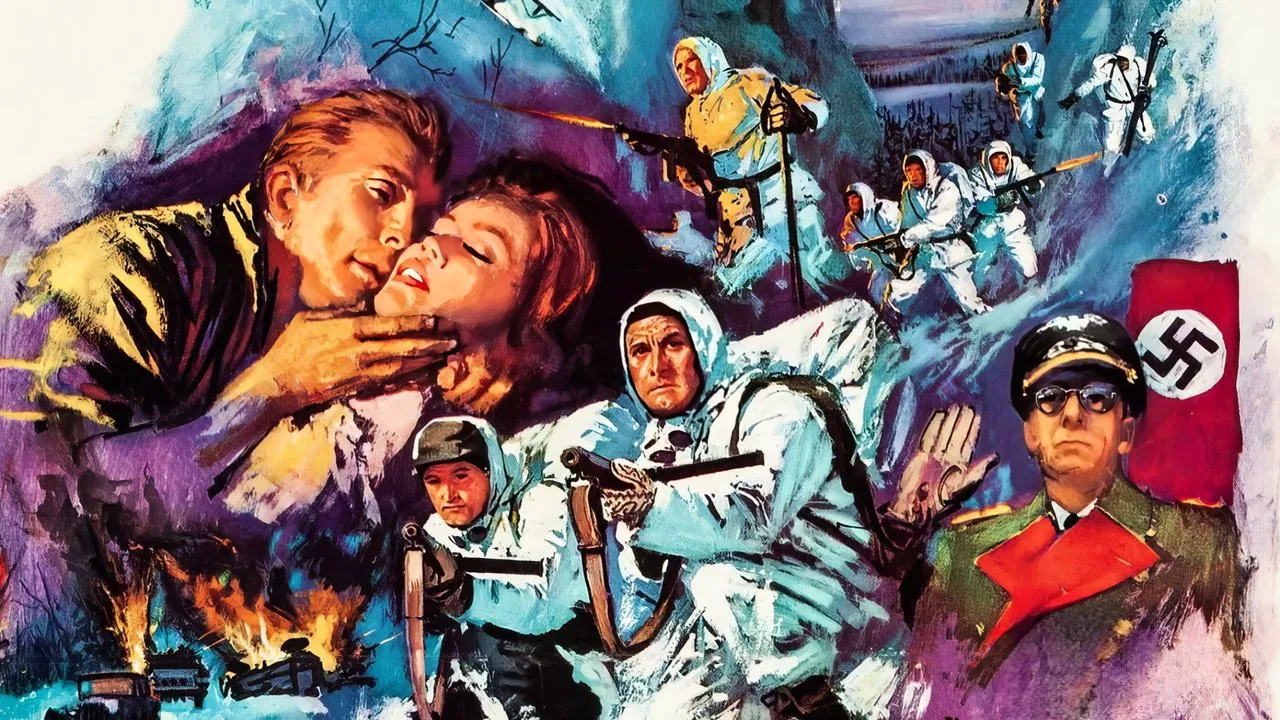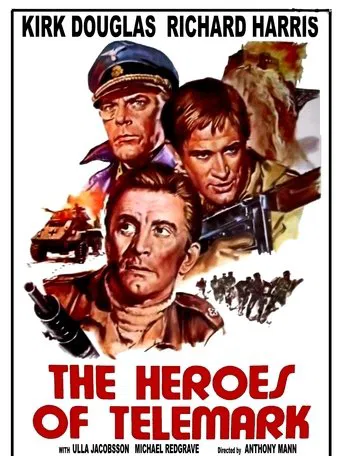



What makes it different from others?
Purely Joyful Movie!
The performances transcend the film's tropes, grounding it in characters that feel more complete than this subgenre often produces.
View MoreI think this is a new genre that they're all sort of working their way through it and haven't got all the kinks worked out yet but it's a genre that works for me.
View MoreThe Heroes of Telemark is directed by Anthony Mann and written by Ben Barzman and Ivan Moffat. It stars Kirk Douglas, Richard Harris, Ulla Jacobsson, Michael Redgrave and David Weston. Music is by Malcolm Arnold and cinematography by Robert Krasker. 1942, Nazi occupied Norway, and the Germans are making great strides with their plans for atomic weaponry. It's down to a band of resistance fighters and a scientist to blow up the German heavy water factory located up in the Telemark mountains. Perhaps it's stating the obvious considering Mann and Krasker's reputations as quality visualists, but The Heroes of Telemark is a splendid looking war movie. It's solidly performed by the cast, the story, which is based on a real and crucial incident in the war, is gripping, while some of the tech flourishes shown by Mann for the more pacy scenes are impressive. Problems only really arise when the film resorts to standard character interactions, shifting focus away from the film's strength, that of the mission, the planning and execution of such. The script doesn't really give the characters much to work with, so in truth it's hard to really care about them in context to their own personal trials and tribulations. However, such is the visual treats and excellent action choreography on show, it still rounds out as a wholesome meaty war epic well worth investing time with. 7/10
View MoreAs a fan of the 1943 war drama, "Edge of Darkness", I was looking forward to this action movie about Norwegian resistance to Nazi occupation. With leads like Kirk Douglas and Richard Harris, I expected much more than I got. What I did find was a technically superior film that was extremely slow moving. This is a very typical story of people defending their homeland from ruthless conquerors through sabotage and standing together, and is very admirable in that sense. Kirk Douglas's role is not fully developed, a major surprise considering his power in Hollywood at that time. Richard Harris gives a much stronger performance with a well-rounded characterization. There is an excellent scene of sabotage and some beautiful location footage, but those moments are few and far between.
View MoreMany of the criticisms of this film I've read here have been based on its apparent historical inaccuracy. I really don't give a hang about that. (If I want to learn history I'll READ.) Rather, my complaints are with the movie as purely an entertainment piece, which is all it was probably ever meant to be. You would think that any film featuring Kirk Douglas paired with Richard Harris could be terrific. But this is just somehow flat. Neither really gets up to capacity and the story tends to get dragged down, often by utterly irrelevant personal background details.In the end, you just don't get the Hooray! feeling that you should after watching a 130 minute film about a couple of guys who saved the world from -gulp- Germans! You're just glad it's over and want to go to the bathroom.
View MoreWar-saboteur reveals:For this was the fight against something bigger and more threatening than ever before; against something which was able to rock the very core of our universe.On the night of 16th February 1943, in "Operation Gunnerside" (named after a village and the moor where the Hambro Family and Sir Charles Hambro, the head of SOE, used to shoot grouse), an additional six Norwegian commandos were dropped by parachute by a Halifax bomber of 138 Squadron from RAF Tempsford. They were successful in landing, and encountered the Swallow team after a few days of searching. The combined team made final preparations for their assault, which was to take place on the night of 27 February.The battle to prevent heavy water production is probably the most dramatic chapter in modern Norwegian history. This was a fight against something bigger, powerful and more threatening than ever before. This was a fight against something which was able to rock the very core of our universe. The Norwegians took up arms in defense of their liberty. The atom bomb in the hands of the invaders could have turned the war, and history could have taken a completely different path. The despot could have become the master of the world. The entire configuration of events was stunning beyond belief. This new weapon was not completed before the intruders were defeated. Some few men who risked their lives to carry out sabotage missions which was more daring and audacious than anything undertaken before.If the heavy water had come under Hitler's control, the dictator would have possessed a weapon that could have ensured «control of the world».Destroying the heavy water factory at Vemork in Telemark, set the production back by a half a year and it contributed to the delay of the German effort to produce an atom bomb. "I've been afraid of not being able to approve of the final result", he explained.That's why he did not portray himself when the movie "The Fight Over Heavy Water" was made in 1948, as many of his friends and colleagues in the resistance group did.Later he experienced a Hollywood portrayal of himself in the "Heroes of Telemark" with Kirk Douglas in the roll of Holmboe Rønneberg. -"The fight over heavy water" was an honest attempt to describe history. On the other hand, he says, "Heroes of Telemark" had little to do with reality.We weren't certain what the heavy water in Vemork was intended used for, says Joachim Holmboe Rønneberg (born 1919) and Birger Strømsheim (born 1911). We were not informed that the Germans wanted to use heavy water to develop an atom bomb. But before we left England, we were told that our action had the highest priority. But we were in no way aware of the large bearing it could have on the outcome of the war.For the allies, it was important that the sabotage in 1943 was successful.We had an assignment (a mission) to accomplish. When at war one does not ask its purpose. Our task was to carry out the blasting. That was for us to accomplish. We knew that 40 British commandos had lost their lives in an attempt a couple of months earlier, and that Vemork stood in danger of being bombed by allied planes if our attempt failed. With that, many civilian lives could be lost. But it was after the war, we first got to know what heavy water was to be used for, says group leader Joachim Holmboe Rønneberg. Together with Birger Strømsheim he carried the responsibility for placing the explosive charges which destroyed the heavy water plant at Vemork.Careful planning, good luck, and co-operation, are the reasons they give the most credit for the success of the action, and without loss of life. The sabotage squad, consisting of nine people, made it to the heavy water plant without being detected by German guards. No crisis occurred until the blasting party was to enter the room containing the heavy water tanks, while the others kept guard outside. By mistake members of the blasting party lost each other. Two of them, among them Joachim Holmboe Rønneberg, got into the plant through a cable intake and began to place the explosives.For Joachim Holmboe Rønneberg the fight began in earnest as he was leaving for Scotland in 1941. He wanted to join the Navy, but after a couple of days met Martin Linge of the close to legendary Linge Company. There he became a fast rising star -- among the British too."Joachim Holmboe Rønneberg was one of the most outstanding men we had. He was well-balanced, intelligent and awfully hardy," narrator Colonel Charles Hampton said in the film program. Just before Christmas 1942, second lieutenant Holmboe Rønneberg, designated as the explosive material expert, was put in charge of the action against the heavy water plant at Vemork. At the end of February the following year, the sabotage action was accomplished-without loss of life."We must not forget history. It can happen again".
View More